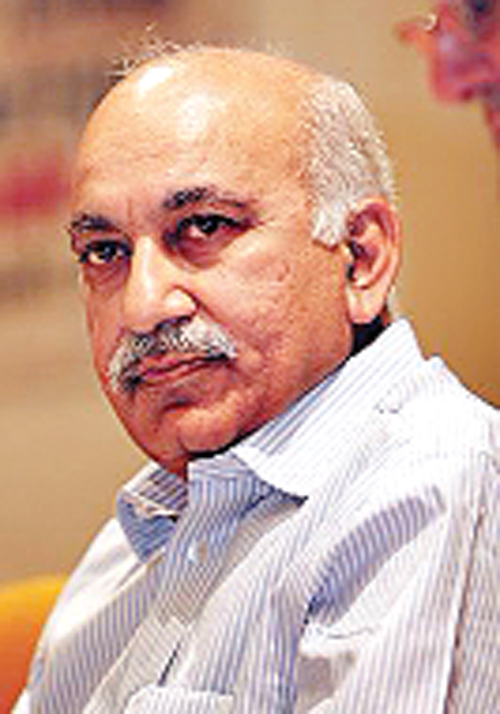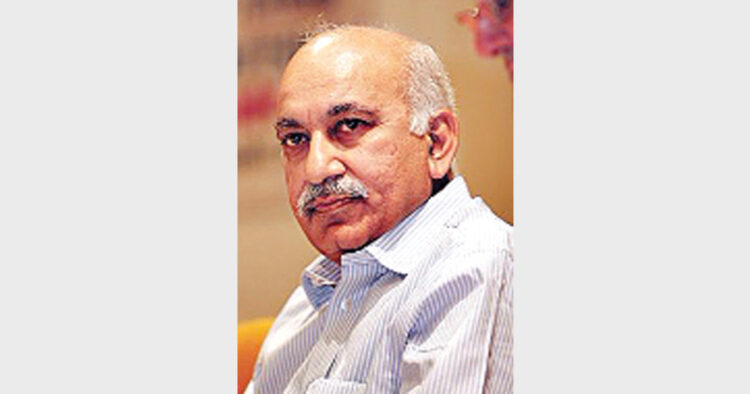M J Akbar
 My personal journey from the Editor’s Cabin to the Parliament of India, was enriching in every sense of the word. It has been a huge learning curve for me. It is one thing to write about poverty and another to look at the stark reality. Bridging the gap between generating awareness to execution of well thought out policies, is what made me the man I am today. I learnt more about poverty by fighting an election and by adopting a naxal affected village under the PM’s Adarsh Gram Yojana Scheme, than by reading the best books on the subject. I was able to ensure that electricity came to this village for the first time and drinking water through tube wells. The privileged and the poor see poverty in different ways. We congratulate ourselves on bringing Below Poverty Line (BPL) down from about 65 per cent to around 30 per cent in nearly seven decades. The poor have a different question. If it took us 70 years to bring the figure down to 30 percent will it take another 70 to bring 30 to 0? Can the poor wait? Why should they wait?
My personal journey from the Editor’s Cabin to the Parliament of India, was enriching in every sense of the word. It has been a huge learning curve for me. It is one thing to write about poverty and another to look at the stark reality. Bridging the gap between generating awareness to execution of well thought out policies, is what made me the man I am today. I learnt more about poverty by fighting an election and by adopting a naxal affected village under the PM’s Adarsh Gram Yojana Scheme, than by reading the best books on the subject. I was able to ensure that electricity came to this village for the first time and drinking water through tube wells. The privileged and the poor see poverty in different ways. We congratulate ourselves on bringing Below Poverty Line (BPL) down from about 65 per cent to around 30 per cent in nearly seven decades. The poor have a different question. If it took us 70 years to bring the figure down to 30 percent will it take another 70 to bring 30 to 0? Can the poor wait? Why should they wait?
It is Prime Minister Modi who has reset the compass from mere poverty alleviation to poverty elimination. This spurred me to shift gear and play an active role in this historical journey towards peace, progress and inclusive growth. I must admit the change of profession entailed its share of challenges like learning new skills and unlearning some old ones. But it was all worth the effort because not everyday do you get a chance to work with an inspired leader like Shri Modi, who is not only a thinker and philosopher but a pragmatic leader, who walks the talk.
I am often asked if I underwent a tectonic shift in my views about politics from the vantage point of a journalist to that of a politician. The answer to this question is slightly complex. To understand the shift in perspective, we’ll have to understand the co-ordinates that define each of this profession. A close simile will be comparing the relationship of a journalist vis-à-vis a politician to that of an auditor vis-à-vis a CEO. Their dharma is different though both aim and work for the well-being of the company. Similarly, journalists and politicians work for the well-being of the nation but with a different focus and from a different vantage point. While a journalist creates awareness about the problems facing society and tries to understand, analyse and criticize the people in power, the business of politics is largely the business of legislation, i.e, making policies to resolve societal problems and ensuring their immaculate implementation. The relationship between the two is not a cold and distant one but one that offers a great deal of flexibility and maneuverability. It should however be kept in mind that the relationship between the two professions is one of objective appreciation and not of unconditional bailout as in professions based on client-based morality like that of a lawyer.
The difference between how journalists see politics and politicians see politics is similar to how an auditor sees a company and how a CEO sees it. Though both want and work for the betterment of the company and place the company’s best interests at the heart of all their decision-making and actions, yet there is a stark difference in their perspective and focus, resulting in a visible difference in their functioning and approach. Having donned both hats, I can say with conviction that both have very different roles demanding different skill sets and mental make-up. They cannot be compared. As for me, I believe in doing my best and giving my 100 per cent to whatever role I am called upon to play.
Speaking of Journalism, the profession is as old as human existence. Narada is said to be the first known reporter. Though I think such narrow, stereotypical depiction of Narada in Hindi movies and serials is unfair. Narada was NOT a mere reporter. He was much more than that. My personal favourite is Sanjay (the narrator of Mahabharata). His objective and balanced coverage of facts makes him a role model worth emulation. Post IT revolution, the world of journalism has undergone tremendous changes. The journalists of today are a well aware, techno-savvy lot, who have a sea of information at their command. All it takes is the click of a button. In our times, eliciting information/data was a Herculean task. While lack of information was a challenge for us, abundance of information is a challenge for today’s generation of journalists. They will have to judiciously deal with the ‘problem of plenty’ in order to stay objective, accurate and relevant.
From my years of experience in this field, my only advice to young journalists would be to never take your eyes off your basic commitment towards your reader, especially the poor and underprivileged sections of the society. They might not contribute to revenue-generation in the form of advertisement but nonetheless it is they who form the pulse of the Nation and are at the core of all policy-making and government initiatives. The reason I am stating this is because it is disheartening to see many path-breaking government initiatives finding no media space in recent times. For instance, the 1,80,000 crore Mudra intitiative that will spur entrepreneurship in a big way was not covered by any major channel while scams of miniscule amount were covered on prime time for days together. That shows our apathy and the focus or lack of focus of media houses. Having said that let me also state that all is not lost and gloomy. There is hope. Lot of good work surfaces every now and then, restoring our faith in the power and potential of media. As a concluding remark, I wish to say that even if 80 per cent of the media is independent and reports objectively without fear or favour, then there is no need to worry as it will ensure a healthy and vibrant atmosphere.
(The writer is a senior journalist and Rajya Sabha MP of Bharatiya Janata Party. As told to K. Ayushi)














Comments